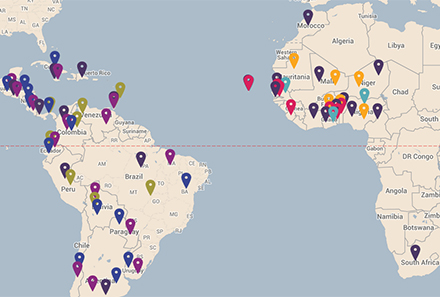
A crop of poppies collected in the Golden Triangle. Drug trafficking represents a major cross-border challenge for many states. Photo from Wikimedia commons.
From drugs, to refugees to bird flu, how can the region and the world better respond to new security issues?
Southeast Asia’s recent Rohingya refugee crisis, and the parallel and still-unfolding horrors in the Mediterranean, are stark and tragic reminders of how the nature of international security has changed in recent decades.
Traditionally, security involved building military strength to deter or repel attacks by other states. Today, beyond a tiny handful of ‘flashpoints’, so-called ‘non-traditional’ security issues dominate: irregular migration, drug trafficking, terrorism, piracy, pandemic disease, environmental degradation, transnational organised crime and cybersecurity – to name but a few. How are states and international organisations dealing with these challenges, and what does this tell us about global politics today?
At first blush, it may appear that the ‘securitisation’ of these issues simply leads to states applying traditional security approaches to new problems. The callous deployment of the Thai, Malaysian and Australian navies to intercept and repel migrant boats, and European Union (EU) proposals to destroy the vessels of Libyan ‘people traffickers’, for example, suggest a militarised response to the complex social, political and economic conditions that are propelling refugee flows.
However, in fact, military responses are not the main way that non-traditional security issues are addressed today. ‘Hard power’ is, at most, deployed only temporarily, while Western governments and international agencies grope for longer-term solutions involving deep interventions into states and societies where these problems are seen to originate.
Thus, halting the refugee flow across the Mediterranean is seen to require the ‘stabilisation’ of Libya, with extensive international involvement in ‘peace-building’ and ‘state-building’. Indeed, the EU’s ‘neighbourhood’ policy had previously built close ties with Colonel Gadaffi and other North African despots, in order to cultivate domestic institutions and agencies that would prevent sub-Saharan African migrants ever reaching Europe.
Similarly, the Australian government has not only outsourced refugee processing to countries like Nauru and Papua New Guinea, and resettled Australia-bound refugees in impoverished Cambodia. It is also intervening in countries where migrants originate to contain them there, seeking to build the capacities of customs and border agencies in places like Sri Lanka.
The underlying logic of ‘containment’ was even expressed in President Bush’s justification for the Afghanistan and Iraq Wars: to ‘fight… terrorists abroad, so we don’t have to face them here at home’. And, of course, in both cases, an initial military invasion was followed by the largest and most costly state-building interventions in history, designed to cultivate domestic institutions that would secure Western security goals.
Research for our new book, Governing Borderless Threats, showed that such intervention to change how foreign states and societies operate is now the dominant way that powerful governments and agencies try to manage non-traditional security threats. Because these threats are seen as transnational – spreading easily across state borders – they do not appear amenable to traditional inter-state solutions, like military force or diplomatic negotiations. Instead, they apparently require new forms of transnational governance that ‘fit’ the scope of the threat. But rather than transferring power wholesale to new or existing international organisations, this is pursued primarily by transforming states in at-risk territories. The goal is to change their domestic institutions and integrate them into multi-level, transboundary governance networks that can manage and contain security threats and risks.
One prominent example is the EU’s Cocaine Route Programme. This is an interlinked series of interventions spanning parts of Latin America and West Africa, tracking the route through which cocaine is smuggled to Europe. It involves enhancing agencies around law enforcement, customs and border control, embedding international ‘best practices’, and networking these institutions across national boundaries. The goal is to cultivate institutions that will enact international disciplines on other parts of their states and societies, particularly those facilitating trafficking.

A screenshot of the EU Cocaine Route Programme’s mapping of drug trafficking.
Importantly, we found such processes were underway even in Asia – where elites are typically seen as extremely jealous of state sovereignty. In case studies of environmental degradation (Southeast Asia’s ‘haze’ problem), transnational crime (money laundering and terrorist financing), and pandemic disease (bird flu), we discovered considerable security-driven state transformation efforts.
For instance, to tackle bird flu, the World Health Organization (WHO) and the Food and Agriculture Organization (FAO) built domestic human and animal health institutions in Indonesia – the epicentre of the global outbreak – where previously none had existed. Staffed partly by international experts, enacting standards set by global bodies, and linked to world health authorities, these agencies have inspected over 170,000 farms and culled tens of thousands of poultry to contain disease outbreaks.
However, we also found that state transformation is always highly contested, with outcomes of security governance projects being powerfully shaped by local political and economic dynamics. Although these projects are generally depicted as neutral, technical, and problem-solving, in reality they are highly political interventions. Changing how domestic governance works, and to what end, always involves changing distributions of power and resources.
In particular, tackling non-traditional security problems often involves efforts to regulate the economic activities that generate them. Stopping transboundary pollution requires tackling polluting industries; interdicting terrorist financing involves regulating financial institutions; and containing pandemic diseases may involve changing how livestock is produced and sold.
Unsurprisingly, then, we found that business groups were key players in contesting and shaping how far, and in what ways, local states were transformed to serve international security agendas. Reflecting Asia’s very tight state-business relationships, they often succeeded in warping or corrupting transformed institutions to suit their interests.
For example, Indonesia’s tightly organised and highly influential poultry sector was able to deflect the WHO-FAO governance projects entirely away from commercial premises and onto ‘backyard’ farmers – households raising chickens for subsistence. Since backyard farmers are actually the victims of bird flu outbreaks originating on commercial farms, this has undermined efforts to curb the disease. Indeed, bird flu remains endemic among poultry in Indonesia.
Moreover, the costs of security intervention were obviously shunted onto the poorest and weakest groups in society. Indeed, this occurred across our cases. Poor farmers bore the brunt of efforts to stop the use of fire to clear land for agriculture, while commercial plantations – the source of most serious transboundary pollution – went untouched. Money-laundering regulations were used to prosecute government enemies, while allies were spared.
The ‘solutions’ to non-traditional security threats thus often reinforce the very inequalities in power and resources that spawns them in the first place. Western donors and agencies are often directly complicit, working around entrenched interests instead of challenging them, in order to maintain access and ‘show results’. In the name of international security, they often exacerbate insecurity for the most disadvantaged, while doing little to control threats and risks.
This can only change if, rather than seeking to manage and contain security problems, we challenge the structures that generate them – structures in which Western governments and agencies are often themselves directly implicated.
Lee Jones is Senior Lecturer in International Politics at Queen Mary, University of London. Shahar Hameiri is Associate Professor of International Politics at Murdoch University.
Their book, Governing Borderless Threats: Non-Traditional Security and the Politics of State Transformation, is available from Cambridge University Press.
 Facebook
Facebook  Twitter
Twitter  Soundcloud
Soundcloud  Youtube
Youtube  Rss
Rss 